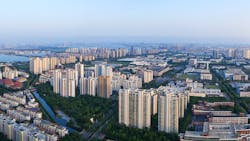Researchers from Xi’an Jiaotong-Liverpool University, China, have created a system to evaluate the water quality challenges in a city and evaluate the city’s water environmental carrying capacity, according to a press release by the university.
The score system measures the maximum capacity of an area to maintain water quality standards while undergoing sustainable social development. The system was applied to the city of Suzhou.
Suzhou, a city in eastern China, has abundant water resources and complex water systems. Almost half of the city's area is covered in water. It is also an important industrial development zone in the Yangtze River Delta region and has undergone rapid urbanization. This makes it challenging for the authorities to manage water resources and the increasing demand for water while controlling sewage and pollution.
By considering various factors, including the condition of Suzhou's water sources, the impact of human activities, and the city's socioeconomic factors, the team found that the city's water capacity has increased since 2001.
The rise suggests that measures taken by the government, like industrial structure optimization and wastewater recycling, have been effective. However, there are still certain aspects that could further improve the water environment.
The findings from this study, published in the journal of Water Resources Management, can help city planners make informed decisions for future development of sustainable cities worldwide.
Managing urban water demands
"We analyzed data from 2001 to 2021 and found that Suzhou's water capacity has increased over time, suggesting better water management and more effective water usage,” said Said Jiaxi Chen, first author of the paper and a masters graduate of XJTLU's Department of Civil Engineering. "During the two-decade period we studied, the industrial structure of Suzhou has been continuously optimized, and more and more attention is being paid to collecting and treating wastewater. This has contributed to a better water environment."
However, Chen says, there are still factors straining the water capacity. "Although the overall water capacity has increased, the total water resources available in Suzhou have fluctuated over the years but slightly decreased in general. Lack of usable water resources can lead to unbalanced water distribution and worse water quality.”
Measures for improvement
The researchers have made several recommendations to further improve water and environmental management in cities.
Chen says: "First of all, the ecosystem should always be protected as it will directly impact water resources,” said Chen. "The government should regulate sewage discharge and prohibit the setting up of polluting enterprises near lakes and wetlands to prevent water pollution at the source. Better control and maintenance of important rivers and lakes can also improve the water environment.”
Efforts should also be made to increase the public's awareness of water conservation.
“The general public needs to be encouraged to adopt more efficient water-use practices,” said Chen. "On the macro level, cities should modify their industrial structure toward one that is compatible with the water capacity. By promoting cleaner production in industry and agriculture, water consumption and pollutant production can be reduced, and water recycling and reuse rates can be enhanced."






